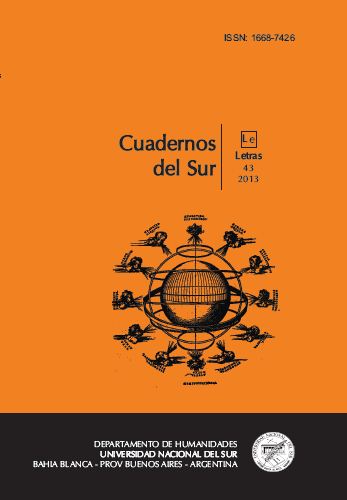La eficacia de la ficción en De Nuptiis Mercurii et Philologiae de Marciano Capela
Keywords:
Menippean satire, Fiction, Martianus CapellaAbstract
In De Nuptiis Mercurii et Philologiae (V a.C.), Martianus Capella relates through an allegorical fable, the marriage between Mercury and Philology, discourse and knowledge respectively. The wedding does not take place in the narrative frame of the work, since there are successive digressions that define the treaties on the seven Liberal Arts, so valued later on by the men of the Middle Ages. In this context, the effectiveness of the narrative form chosen plays a key role, especially considering that the discursive ability as a means of having access to the truth is called into question from the outcome of the fable. Thus, De Nuptiis ranges from fictional story and true story, from the alternation of two main narrators: Martianus and Satura, helped to compose the work by the literary genre itself, which becomes, at the same time, their main critique. The present paper analyzes the place of fiction in Martianus' work in multiple levels: as an abstract narrative plot, as an allegorized figure in the character of Satura, and as a problematic literary representation.
Downloads
References
Ramelli, Ilaria (ed.) (2006), Marziano Capella. Le nozze di Mercurio e Filologia, Milano, Bompiani.
Bajtín, Mijail (1986), Problemas de la poética de Dostoievski, México D.F., Fondo de Cultura Económica.
Barthelmess, Jane J. (1974), The Fictional Narrative de Nuptiis Philologiae et Mercurii of Martianus Capella as Allegory, Seattle, University of Washington Press.
Booth, Wayne C. (1961), The Rhetoric of Fiction, Chicago-London, University of Chicago Press.
Bovey, Muriel (2003), Disciplinae cyclicae. L’organisation du savoir dans l’oeuvre de Martianus Capella, Trieste, Edizioni Universitá di Trieste.
Cardigni, Julieta (2013), “La eficacia de la ficción en De nuptiis Mercuri et Philologiae de
Marciano Capela”, Primeras Jornadas Nacionales e Internacionales de Ficcionalización y Narración en la Antigüedad, el Tardoantiguo y el Medioevo “Un milenio de contar historias”, UBA, 28 y 29 de noviembre.
Cherpack, Clifton (1974), “Ideas and prose fiction in Late Antiquity”, Comparative Literature Studies, vol. 11, nº 3, Spring, pp. 185-203.
Frye, Northrop (1957), Anatomy of criticism, Princeton, Princeton University Press.
Hadot, Ilsetraut (2006), Arts libéraux et philosophie dans la pensée antique
Contribution à l’histoire de l’éducation et de la culture dans l’Antiquité, Paris, Vrin.
Ligota, Christopher R. (1982), “‘This story is not true’: Facts and Fiction in Antiquity”, Journal of the Warburg and Courtauld Institutes, vol. 45, pp. 1-13.
Relihan, Joel C. (1993), Ancient Menippean Satire, Baltimore, Johns Hopkins University Press.
Sandy, Gerald N. (1974), “Recent Scholarship on the Prose Fiction of Classical Antiquity”, The Classical World, vol. 67, nº 6, April-May, pp. 321-359.
Shanzer, Danuta (1986), A philosophical and Literary Commentary on Martianus Capella’s De Nuptiis Philologiae et Mercurii, Berkeley, University of California Press.
Stahl, William Harris (1969), “The Quadrivium of Martianus Capella. Its place in the intellectual history of Western Europe”, en Arts Libéraux et Philosophie au Moyen ge, Montréal-Paris, pp. 959-967.
Swigger, Ronald T. (1975), “Fictional Encyclopedism and the Cognitive Value of Literature”, Comparative Literature Studies, vol. 12, nº 4, pp. 351-366.
Williams, Craig A. (2004), Martial Epigrams, Oxford, Oxford University Press.
Downloads
How to Cite
Issue
Section
License
Copyright (c) 2013 Julieta Cardigni

This work is licensed under a Creative Commons Attribution-NonCommercial-ShareAlike 4.0 International License.
Aquellos autores/as que tengan publicaciones con esta revista, aceptan los términos siguientes:
- Los autores/as conservarán sus derechos de autor y garantizarán a la revista el derecho de primera publicación de su obra, el cuál estará simultáneamente sujeto a la licencia Atribución-No Comercial 4.0 Internacional CC BY-NC 4.0.
- Los autores/as podrán adoptar otros acuerdos de licencia no exclusiva de distribución de la versión de la obra publicada (p. ej.: depositarla en un archivo telemático institucional o publicarla en un volumen monográfico) siempre que se indique la publicación inicial en esta revista.
- Se permite y recomienda a los autores/as difundir su obra a través de Internet (p. ej.: en archivos telemáticos institucionales o en su página web) una vez publicado su trabajo, lo cual puede producir intercambios interesantes y aumentar las citas de la obra publicada. (Véase El efecto del acceso abierto).










